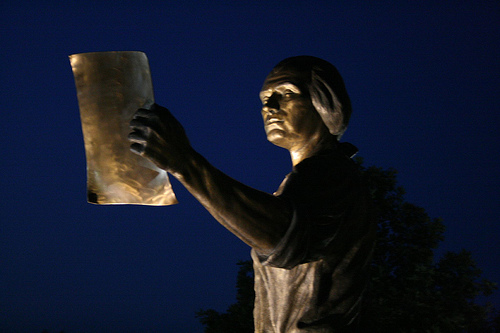Well. No wonder we're so confused.
My writing partner Ben Boychuk and I had the pleasure of interviewing author Ron Chernow this week. He wrote the acclaimed new biography of George Washington, along with an earlier bio of Alexander Hamilton -- he knows something, in other words, about the founding of this country. In our discussion, Chernow repeated his assertion (first made in a New York Times op-ed) that today's Tea Partiers are wrong to claim an exclusive ideological heritage descended from the Founders. In truth, Chernow said, the Constitution was a compromise between competing visions of government -- powerful or limited? Instead of actually settling the question, the Founders fudged it a bit, so that the arguments of the 21st century aren't so different from the 18th.
Nowhere is that tension more evident, perhaps, than in James Madison's authorship of Federalist 39. Madison's intent here is to fend off criticism of the proposed new government as insufficiently federal -- that is, he's arguing against the proposition that the Constitution takes away too much power away from the states and deposits it in the national government.
Wait: That's kind of what the Constitution was created to do. The Articles of Confederation, which gave pride of power to the states, had already proved unworkable as a means of national government. But yesterday's antifederalists, like today's Tea Partiers, wanted to see more power left to the states -- and they were ruthless in suggesting that advocates of the Constitution were lying in their efforts to convince Americans that states still retained considerable power. Here's "A Farmer" writing in Antifederalist No. 3:
There are but two modes by which men are connected in society, the one which operates on individuals, this always has been, and ought still to be called, national government; the other which binds States and governments together (not corporations, for there is no considerable nation on earth, despotic, monarchical, or republican, that does not contain many subordinate corporations with various constitutions) this last has heretofore been denominated a league or confederacy. The term federalists is therefore improperly applied to themselves, by the friends and supporters of the proposed constitution. This abuse of language does not help the cause; every degree of imposition serves only to irritate, but can never convince. They are national men, and their opponents, or at least a great majority of them, are federal, in the only true and strict sense of the word.
Madison has tricky political ground to cover here, then, and he treads cautiously and confusingly. Let's jump to the final paragraph of 39 for a picture of the ambiguity.
The proposed Constitution, therefore is, in strictness, neither a national nor a federal Constitution, but a composition of both. In its foundation it is federal, not national; in the sources from which the ordinary powers of the government are drawn, it is partly federal and partly national; in the operation of these powers, it is national, not federal; in the extent of them, again, it is federal, not national; and, finally, in the authoritative mode of introducing amendments, it is neither wholly federal nor wholly national.
Got that?
Now it's true that something can be partly one thing and partly another. But this paragraph -- and the whole paper -- makes me wonder if the effort to sell the Constitution as a document of "limited" government is more a political sales job than a substantive description.
The new government, after all, will have unlimited power of taxation. It will be the arbiter of disputes between the states. It alone has the power to raise a standing army. The one power the states seem to retain over the national government at this stage is whether or not to opt-in to the system. After that, they can shape it somewhat -- through electoral votes and appointments to the Senate -- but there are no real veto points once the national government has made up its mind about a course of action. The states can give legitimacy to the national government; there's no real mechanism for them to withdraw it.
That's not to say the national government has unlimited power overall. It has its spheres of influence, and the states have theirs.
In this relation, then, the proposed government cannot be deemed a national one; since its jurisdiction extends to certain enumerated objects only, and leaves to the several States a residuary and inviolable sovereignty over all other objects.
But the national government's spheres of action are biggies. That's why the antifederalists fought the Constitution.
I'm not arguing for all this as a brief for unlimited central government, incidentally. I'm rather haphazardly trying to make sense of this as a pitch at the time, and looking at it in light of what actually happened in America's history. And what I'm seeing here is this: James Madison, whether he wanted to or not, left the door open to a bigger government than what today's Tea Partiers want -- or perhaps he himself envisioned.
How wide? I suspect we'll find that out in the coming papers.



